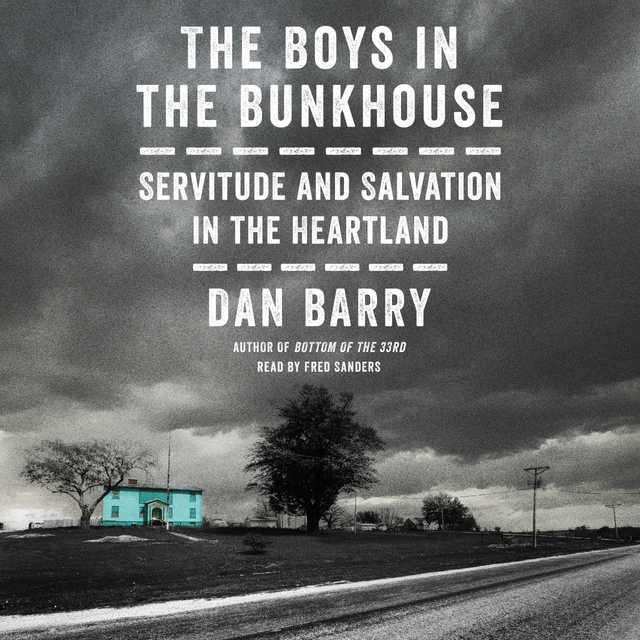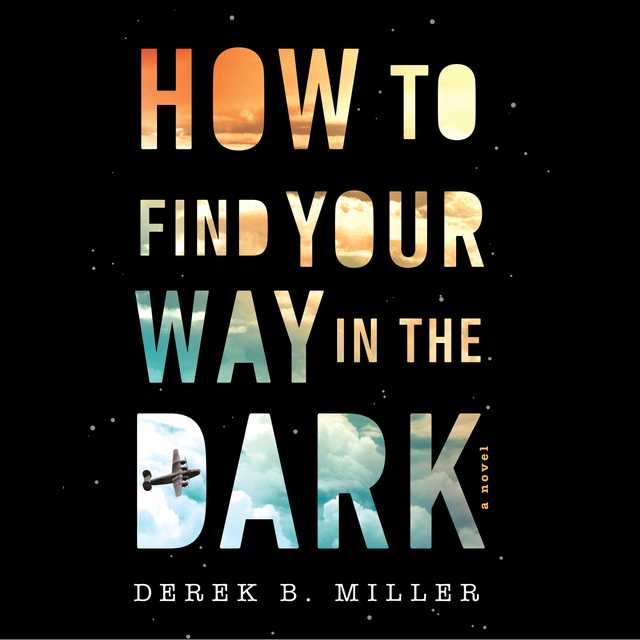The Boys in the Bunkhouse Audiobook Summary
With this Dickensian tale from America’s heartland, New York Times writer and columnist Dan Barry tells the harrowing yet uplifting story of the exploitation and abuse of a resilient group of men with intellectual disability, and the heroic efforts of those who helped them to find justice and reclaim their lives.
In the tiny Iowa farm town of Atalissa, dozens of men, all with intellectual disability and all from Texas, lived in an old schoolhouse. Before dawn each morning, they were bussed to a nearby processing plant, where they eviscerated turkeys in return for food, lodging, and $65 a month. They lived in near servitude for more than thirty years, enduring increasing neglect, exploitation, and physical and emotional abuse–until state social workers, local journalists, and one tenacious labor lawyer helped these men achieve freedom.
Drawing on exhaustive interviews, Dan Barry dives deeply into the lives of the men, recording their memories of suffering, loneliness and fleeting joy, as well as the undying hope they maintained despite their traumatic circumstances. Barry explores how a small Iowa town remained oblivious to the plight of these men, analyzes the many causes for such profound and chronic negligence, and lays out the impact of the men’s dramatic court case, which has spurred advocates–including President Obama–to push for just pay and improved working conditions for people living with disabilities.
A luminous work of social justice, told with compassion and compelling detail, The Boys in the Bunkhouse is more than just inspired storytelling. It is a clarion call for a vigilance that ensures inclusion and dignity for all.
Other Top Audiobooks
The Boys in the Bunkhouse Audiobook Narrator
Fred Sanders is the narrator of The Boys in the Bunkhouse audiobook that was written by Dan Barry
Dan Barry is a reporter and columnist for the New York Times. In 1994 he was part of an investigative team at the Providence Journal that won the Pulitzer Prize for a series of articles on Rhode Island’s justice system. He is the author of a memoir, a collection of his About New York columns, and Bottom of the 33rd, for which he won the 2012 PEN/ESPN Award for Literary Sports Writing. He lives with his wife and two daughters in Maplewood, New Jersey.
About the Author(s) of The Boys in the Bunkhouse
Dan Barry is the author of The Boys in the Bunkhouse
More From the Same
- Author : Dan Barry
- Bottom of the 33rd
- This Land
- Publisher : HarperAudio
- Abraham
- American Gods [TV Tie-In]
- Dead Ringer
- House of Sand and Fog
- Prey
The Boys in the Bunkhouse Full Details
| Narrator | Fred Sanders |
| Length | 9 hours 44 minutes |
| Author | Dan Barry |
| Category | |
| Publisher | HarperAudio |
| Release date | May 17, 2016 |
| ISBN | 9780062561152 |
Subjects
The publisher of the The Boys in the Bunkhouse is HarperAudio. includes the following subjects: The BISAC Subject Code is History, Social History
Additional info
The publisher of the The Boys in the Bunkhouse is HarperAudio. The imprint is HarperAudio. It is supplied by HarperAudio. The ISBN-13 is 9780062561152.
Global Availability
This book is only available in the United States.
Goodreads Reviews
Larry
January 06, 2017
This is both a sweet book and a horrifying book. It is about 32 men with intellectual disabilities who worked in a turkey processing plant in a small town in Iowa for decades in the 1970s 1980s and 1990s. They were underpaid and overworked and mistreated and loved by many in the small town where they lived. They participated in the community life and the religious life of the town and were well-known to the people of the town. At the same time the people of the town had no idea of their life within the bunkhouse where they lived. The conditions of their life were occasionally realized yet ignored. They came to Iowa from far away, mostly from Texas. The company that employed them was also in Texas.This is a book about people with disabilities and how they were eventually rescued from inhumane circumstances. It is about how they eventually won a large judgment in court and their lives after they left the bunkhouse for better lives. It is about the people who rescued them and the people who loved them yet were unaware of their conditions.I listened to the Audible book and it was pretty good. The book bounced around a little bit going from one aspect of the story to another. Not exactly linear but not too hard to follow. What was a little difficult was transitioning from the sweet to the horror to the sweet. It covered a lot of territory including the national politics of disability rights. The story of the company that provided these individuals to Turkey processors in several states was interesting. The owner of the company actually came to Iowa and lived with the boys (that's what the disabled men are called) for quite a while and was an interesting character who in a strange way was very generous with the men.I gave this book for stars not because I thought it was so well written although it was pretty good and intriguing to listen to. I gave it four stars because it highlighted a social issue using the personal stories of the disabled men. In spite of the court victory the men didn't end up with a lot of money and the bad guys didn't end up in prison.
Carlos
July 16, 2016
This book was an eye opener for me, I usually am not attracted by books about social issues... Sometimes they get too real for me , but I loved this book, it deals with the deplorable treatment of a group of people who suffered from mental problems , how their treatment was ignored by everyone around them and asks the question ... Who is to blame for this? And it turns out we all kind of are .... Like I said .... Eye opener !
John
October 14, 2016
"With pen and paper, she recorded the breaches in the duct-taped ceilings; the mouse droppings on kitchen shelves; the moldy mattress propped up against the hallway wall; the cockroaches." She was a social worker called to investigate conditions at an old schoolhouse converted to house 32 intellectually handicapped men (low IQ) who worked at a nearby turkey processing plant. They had been there 30 years. This is the poignant story of their near-slavery living conditions, not particularly bad at first, but deteriorating as the men aged. I cringed while reading about how turkeys are killed and eviscerated, how the men engaged in this slippery, smelly, shit-fluttering process with seeming alacrity, even when, as the years passed, it deformed their fingers and harmed their health. Supervisors seemed indifferent or perhaps just overwhelmed by the care challenges. Author's writing and thoroughness of reporting and is superb. He interviews plant operators, townsfolk and the men, even to their "retirement" to group and nursing homes.
Linda
June 09, 2016
Never in my dreams did I imagine that something like this could take place in the good old USA, but it did, right in Atalissa, Iowa. Thirty something intellectually disabled men living in a run down old school house for decades, exploited and abused, working in a turkey processing plant for a mere $65/month! There where many whistle blowers throughout the years, but these complaints all fell on deaf ears, it was always someone else's problem. Stripped of their families and dignity, the author did a wonderful job of telling each man's story, giving them the utmost respect, and also gave each one of them a face (loved the pictures!) and a voice. In closing this review, like "the boys," after reading this, I don't think I ever want to eat turkey again and also, I would just love to meet them and give them all a hug! And maybe we could go out to dinner at the Golden Corral and karaoke afterwards. Thank you to the author, Dan Barry, for bringing light to this situation and hopefully this tragedy will be prevented from happening in the future.
Joan
January 23, 2018
After reading a couple chapters and putting this book aside, I finished it in the last 9 hours, with tears running down my face.
Jeanine
December 29, 2016
Well written and researched, the story of these men is heartbreaking.
Charles Bill
March 21, 2018
All Iowa Reads Choice for adults. Discussed at WIT book club. I was not enthusiastic about this book going in, but it was a memorable, important experience. Good crowd at book club. Some new people and a very lively discussion. A group of mentally challenged men from Texas are moved into an old school building in a very small town in Iowa. They work at a turkey processing plant and are paid very little. Their living conditions steadily deteriorate over decades. Despite many warnings, those who should help them don't until a breaking point is reached. And this is 2009, not the dark ages. Countless questions and themes emerge. Barry is a tenacious and thorough investigator and does a good job of telling the story. A lot of repetition in the book and some "poetic" passages are cringeworthy, but these are easy to overlook with the important story and messages of this book. The Sioux City Public Library will have a discussion of this book in the fall and I'll be eager to attend.
Liz
February 02, 2020
This was an interesting book. At times, it was a bit long (wordy) but I appreciated all the stories. I also felt Dan Barry made readers understand (a bit more) how something like this could happen so recently. The stories of what the men went through is disheartening.
Sarah
January 27, 2020
** spoiler alert ** This is truly a surprising true story. I thought that when I initially started listening to this book that it took place in the distant past. It does not. The events take place in modern times and likens itself to a workhouse prison system.The book opens with social workers finding a large group of 60-70 men who have varying degrees of mental disability living in an abandoned school house together. The building is not the best, and in many cases, the men are living multiple people to a room, and the accommodations are not very nice. Sometimes just a mattress on the floor. The building is infested with creatures. The men are largely self-sufficient, but have been working in servitude, sometimes for 20+ years at a turkey factory nearby. They are doing hard labor, killing and readying turkeys for food production.Their salaries were "managed" by their employer, Henry's Turkey Service, who paid them below minimum wage and then docked their pay for room and board (which is an exorbitant amount, considering the conditions they were found in). The men would be given a small allowance each week, which they would spend at the local convenience store on soda, beer, and snacks. While many seemed happy at the lifestyle and being surrounded by other men who did the same work, they were taken from their families. Most of the men were from Texas and the plant was in Iowa. Despite the men asking after their families, many were never given an answer or a means to contact anyone outside the turkey plant. They also never received any medical attention, so once they were rescued, many had dental problems and physical disabilities. Despite their complaints to management, they were ignored.Some were punished in their off-hours if they did not perform in a satisfactory manner. They were shamed in front of the other men, or maybe they weren't given their allowance to spend at the store. One attempted to escape and died of frostbite on his journey. And yet, the operation continued.The big question here is: how did this happen in a first-world country? How were these men overlooked for so long? Is America's desire for cheap turkey justify treating people in this manner? The story is still mind-boggling, and no amount of court justice can give these men back the time lost with their families or their health. A troubling story, but one that is worth being heard.
Sandra
August 12, 2019
Sad but very elegantly written true story of 32 men who came from various state schools and institutions because of intellectual disability. (There were many more, but the book focuses on the last group before their rescue.) They were hired . . . well, more accurately, sent as young men to a turkey processing company that agreed to try to train them and put them to work while also giving them a place to live. Ultimately, these men end up as slaves; they receive $65 per month in addition to room and board (in a house that eventually becomes a filthy health hazard), but they can't leave, and some of the “supervisors” really abused them, while others took better care of them.The story is fascinating, though, and tells a sad history of the treatment of the disabled in our country, of people who just ditched their children because they didn’t want to take care of them any more, of people who believed the state schools were good places but then couldn’t get in touch with their children, of people who felt they were doing society a favor by putting the men to work, of other people who really seemed to have cared about the guys and took excellent care of them but thought keeping virtually all their money and making sure they didn’t leave was justified.As much as it is tempting to see good and evil, good guys verses bad guys, I don't think it's that simple. Neither does the author, although he tends to be a little more willing to assign blame on some of the people than I. But he carefully researched this complicated story (remember, the victims here mostly suffer from intellectual disabilities, which adds a level of complexity to the task of reconstructing the past); maybe he’s right about some things that really gave me pause, such as the culpability of the residents of Atalissa, Iowa, where the “boys,” as they were known, ultimately ended up. Those men were active residents in the community, but the residents were apparently unaware of the abuses. I felt bad for those residents; it seems that they were very fond of the men, and because when they had seen the living arrangements things hadn’t deteriorated so badly. They also weren’t aware of the financial arrangements.This is quite well written and I found it to be a very quick read; it’s engrossing, and because of the narrative style of the author it’s a quick read.
Karna
October 17, 2018
Thoughtful look into a human tragedy that put Iowa, individuals with disabilities, and government regulations in the national spotlight.This 2018 All Iowa Reads Selection is an easy read yet a difficult one to digest. At its premise is a group of men with intellectual disabilities brought to the state from Texas to work in a turkey processing plant, in jobs that few others wanted. For 30 years, they completed the same repetitive tasks and participated in the activities of the small community in which they lived. Then, one Sunday morning in 2009, they were gone and the doors to the dilapidated, old schoolhouse where they had lived were opened. They were known as "the boys" to everyone in the small Iowa town who embraced them and to those in the Texas organization who hired them but few knew of the mistreatment they received and the injustices levied against them due to their disabilities. New York Times reporter and columnist Dan Barry picks up on reporting by the Des Moines Register, delves deep into the lives of these men, and explores society's role in taking care of its most vulnerable members. I suspect readers will want to point fingers and place blame on someone or some organization as they progress through the book--and there are surely ample reasons to do so--but we should, instead, consider our individual voices and what we can do to ensure the proper care and treatment of everyone we come into contact with. Read as a selection of my local library's book club.
Frequently asked questions
Listening to audiobooks not only easy, it is also very convenient. You can listen to audiobooks on almost every device. From your laptop to your smart phone or even a smart speaker like Apple HomePod or even Alexa. Here’s how you can get started listening to audiobooks.
- 1. Download your favorite audiobook app such as Speechify.
- 2. Sign up for an account.
- 3. Browse the library for the best audiobooks and select the first one for free
- 4. Download the audiobook file to your device
- 5. Open the Speechify audiobook app and select the audiobook you want to listen to.
- 6. Adjust the playback speed and other settings to your preference.
- 7. Press play and enjoy!
While you can listen to the bestsellers on almost any device, and preferences may vary, generally smart phones are offer the most convenience factor. You could be working out, grocery shopping, or even watching your dog in the dog park on a Saturday morning.
However, most audiobook apps work across multiple devices so you can pick up that riveting new Stephen King book you started at the dog park, back on your laptop when you get back home.
Speechify is one of the best apps for audiobooks. The pricing structure is the most competitive in the market and the app is easy to use. It features the best sellers and award winning authors. Listen to your favorite books or discover new ones and listen to real voice actors read to you. Getting started is easy, the first book is free.
Research showcasing the brain health benefits of reading on a regular basis is wide-ranging and undeniable. However, research comparing the benefits of reading vs listening is much more sparse. According to professor of psychology and author Dr. Kristen Willeumier, though, there is good reason to believe that the reading experience provided by audiobooks offers many of the same brain benefits as reading a physical book.
Audiobooks are recordings of books that are read aloud by a professional voice actor. The recordings are typically available for purchase and download in digital formats such as MP3, WMA, or AAC. They can also be streamed from online services like Speechify, Audible, AppleBooks, or Spotify.
You simply download the app onto your smart phone, create your account, and in Speechify, you can choose your first book, from our vast library of best-sellers and classics, to read for free.
Audiobooks, like real books can add up over time. Here’s where you can listen to audiobooks for free. Speechify let’s you read your first best seller for free. Apart from that, we have a vast selection of free audiobooks that you can enjoy. Get the same rich experience no matter if the book was free or not.
It depends. Yes, there are free audiobooks and paid audiobooks. Speechify offers a blend of both!
It varies. The easiest way depends on a few things. The app and service you use, which device, and platform. Speechify is the easiest way to listen to audiobooks. Downloading the app is quick. It is not a large app and does not eat up space on your iPhone or Android device.
Listening to audiobooks on your smart phone, with Speechify, is the easiest way to listen to audiobooks.






























